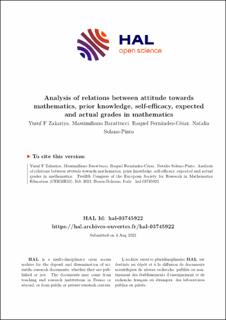Analysis of relations between attitude towards mathematics, prior knowledge, self-efficacy, expected and actual grades in mathematics
Chapter
Published version
Permanent lenke
https://hdl.handle.net/11250/3068481Utgivelsesdato
2022Metadata
Vis full innførselSamlinger
Originalversjon
Zakariya, Y. F., Barattucci, M., Fernández-Cézar, R. & Solano-Pinto, N. (2022). Analysis of relations between attitude towards mathematics, prior knowledge, self-efficacy, expected and actual grades in mathematics. Twelfth Congress of the European Society for Researchin Mathematics Education(CERME12). https://hal.science/hal-03745922Sammendrag
The purpose of this study is to analyse relations between students’ attitude towards mathematics, prior knowledge, self-efficacy, expected grades, and performance in mathematics among 115 firstyear engineering students. We combine two statistical techniques to analyse the data we generated by questionnaires and two tests. First, item-level modeling, in terms of confirmatory factor analysis, which we use to compute the factor scores of construct-validated measures, and to control for measurement errors. Second, composite modeling, in terms of path analysis, which we use to test the research hypotheses. The findings show that both self-efficacy and expected grades have substantial effects on students’ performance. Prior knowledge has a non-trivial effect on self-efficacy which, in turn, plays a significant role in students’ grade expectations. All other hypothesised relations are not significant. We argue that these findings confirm some basic tenets of social cognitive theory. Keywords: Affect, higher education, item-level modeling, path analysis, self-efficacy.
